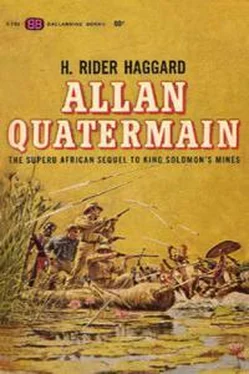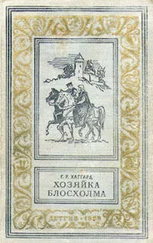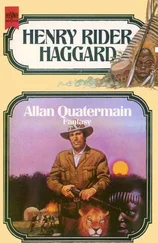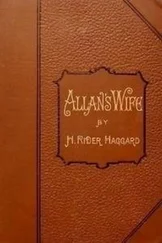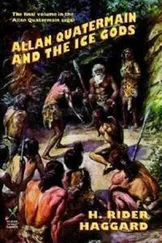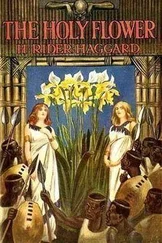It was Good who solved the question. 'Here is water,' he said, pointing to the Tana River; 'and yesterday I saw a party of natives hunting hippopotami in canoes. I understand that Mr Mackenzie's mission station is on the Tana River. Why not get into canoes and paddle up to it?'
This brilliant suggestion was, needless to say, received with acclamation; and I instantly set to work to buy suitable canoes from the surrounding natives. I succeeded after a delay of three days in obtaining two large ones, each hollowed out of a single log of some light wood, and capable of holding six people and baggage. For these two canoes we had to pay nearly all our remaining cloth, and also many other articles.
On the day following our purchase of the two canoes we effected a start. In the first canoe were Good, Sir Henry, and three of our Wakwafi followers; in the second myself, Umslopogaas, and the other two Wakwafis. As our course lay upstream, we had to keep four paddles at work in each canoe, which meant that the whole lot of us, except Good, had to row away like galley–slaves; and very exhausting work it was. I say, except Good, for, of course, the moment that Good got into a boat his foot was on his native heath, and he took command of the party. And certainly he worked us. On shore Good is a gentle, mild–mannered man, and given to jocosity; but, as we found to our cost, Good in a boat was a perfect demon. To begin with, he knew all about it, and we didn't. On all nautical subjects, from the torpedo fittings of a man–of–war down to the best way of handling the paddle of an African canoe, he was a perfect mine of information, which, to say the least of it, we were not. Also his ideas of discipline were of the sternest, and, in short, he came the royal naval officer over us pretty considerably, and paid us out amply for all the chaff we were wont to treat him to on land; but, on the other hand, I am bound to say that he managed the boats admirably.
After the first day Good succeeded, with the help of some cloth and a couple of poles, in rigging up a sail in each canoe, which lightened our labours not a little. But the current ran very strong against us, and at the best we were not able to make more than twenty miles a day. Our plan was to start at dawn, and paddle along till about half–past ten, by which time the sun got too hot to allow of further exertion. Then we moored our canoes to the bank, and ate our frugal meal; after which we ate or otherwise amused ourselves till about three o'clock, when we again started, and rowed till within an hour of sundown, when we called a halt for the night. On landing in the evening, Good would at once set to work, with the help of the Askari, to build a little 'scherm', or small enclosure, fenced with thorn bushes, and to light a fire. I, with Sir Henry and Umslopogaas, would go out to shoot something for the pot. Generally this was an easy task, for all sorts of game abounded on the banks of the Tana. One night Sir Henry shot a young cow–giraffe, of which the marrow–bones were excellent; on another I got a couple of waterbuck right and left; and once, to his own intense satisfaction, Umslopogaas (who, like most Zulus, was a vile shot with a rifle) managed to kill a fine fat eland with a Martini I had lent him. Sometimes we varied our food by shooting some guinea–fowl, or bush–bustard (paau)—both of which were numerous—with a shot–gun, or by catching a supply of beautiful yellow fish, with which the waters of the Tana swarmed, and which form, I believe, one of the chief food–supplies of the crocodiles.
Three days after our start an ominous incident occurred. We were just drawing in to the bank to make our camp as usual for the night, when we caught sight of a figure standing on a little knoll not forty yards away, and intensely watching our approach. One glance was sufficient—although I was personally unacquainted with the tribe—to tell me that he was a Masai Elmoran, or young warrior. Indeed, had I had any doubts, they would have quickly been dispelled by the terrified ejaculation of ' Masai !' that burst simultaneously from the lips of our Wakwafi followers, who are, as I think I have said, themselves bastard Masai.
And what a figure he presented as he stood there in his savage war–gear! Accustomed as I have been to savages all my life, I do not think that I have ever before seen anything quite so ferocious or awe–inspiring. To begin with, the man was enormously tall, quite as tall as Umslopogaas, I should say, and beautifully, though somewhat slightly, shaped; but with the face of a devil. In his right hand he held a spear about five and a half feet long, the blade being two and a half feet in length, by nearly three inches in width, and having an iron spike at the end of the handle that measured more than a foot. On his left arm was a large and well–made elliptical shield of buffalo hide, on which were painted strange heraldic–looking devices. On his shoulders was a huge cape of hawk's feathers, and round his neck was a 'naibere', or strip of cotton, about seventeen feet long, by one and a half broad, with a stripe of colour running down the middle of it. The tanned goatskin robe, which formed his ordinary attire in times of peace, was tied lightly round his waist, so as to serve the purposes of a belt, and through it were stuck, on the right and left sides respectively, his short pear–shaped sime, or sword, which is made of a single piece of steel, and carried in a wooden sheath, and an enormous knobkerrie. But perhaps the most remarkable feature of his attire consisted of a headdress of ostrich–feathers, which was fixed on the chin, and passed in front of the ears to the forehead, and, being shaped like an ellipse, completely framed the face, so that the diabolical countenance appeared to project from a sort of feather fire–screen. Round the ankles he wore black fringes of hair, and, projecting from the upper portion of the calves, to which they were attached, were long spurs like spikes, from which flowed down tufts of the beautiful black and waving hair of the Colobus monkey. Such was the elaborate array of the Masai Elmoran who stood watching the approach of our two canoes, but it is one which, to be appreciated, must be seen; only those who see it do not often live to describe it. Of course I could not make out all these details of his full dress on the occasion of this my first introduction, being, indeed, amply taken up with the consideration of the general effect, but I had plenty of subsequent opportunities of becoming acquainted with the items that went to make it up.
Whilst we were hesitating what to do, the Masai warrior drew himself up in a dignified fashion, shook his huge spear at us, and, turning, vanished on the further side of the slope.
'Hulloa!' holloaed Sir Henry from the other boat; 'our friend the caravan leader has been as good as his word, and set the Masai after us. Do you think it will be safe to go ashore?'
I did not think it would be at all safe; but, on the other hand, we had no means of cooking in the canoes, and nothing that we could eat raw, so it was difficult to know what to do. At last Umslopogaas simplified matters by volunteering to go and reconnoitre, which he did, creeping off into the bush like a snake, while we hung off in the stream waiting for him. In half an hour he returned, and told us that there was not a Masai to be seen anywhere about, but that he had discovered a spot where they had recently been encamped, and that from various indications he judged that they must have moved on an hour or so before; the man we saw having, no doubt, been left to report upon our movements.
Thereupon we landed; and, having posted a sentry, proceeded to cook and eat our evening meal. This done, we took the situation into our serious consideration. Of course, it was possible that the apparition of the Masai warrior had nothing to do with us, that he was merely one of a band bent upon some marauding and murdering expedition against another tribe. But when we recalled the threat of the caravan leader, and reflected on the ominous way in which the warrior had shaken his spear at us, this did not appear very probable. On the contrary, what did seem probable was that the party was after us and awaiting a favourable opportunity to attack us. This being so, there were two things that we could do—one of which was to go on, and the other to go back. The latter idea was, however, rejected at once, it being obvious that we should encounter as many dangers in retreat as in advance; and, besides, we had made up our minds to journey onwards at any price. Under these circumstances, however, we did not consider it safe to sleep ashore, so we got into our canoes, and, paddling out into the middle of the stream, which was not very wide here, managed to anchor them by means of big stones fastened to ropes made of coconut–fibre, of which there were several fathoms in each canoe.
Читать дальше
